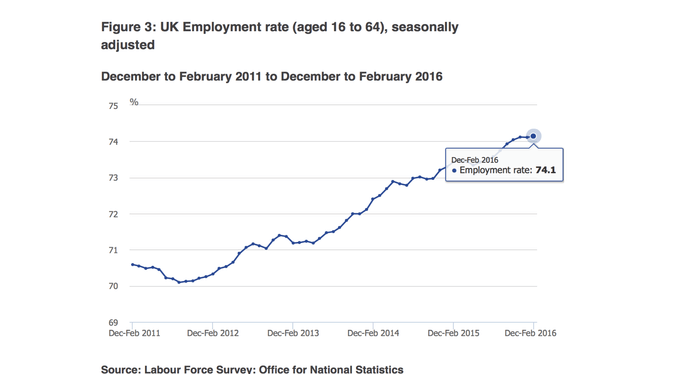In April, the first dip in employment figures for 3 months was released. Despite the dip, the employment rate is still on par with the highest rate since the 1971 comparable records began. It’s good to look at this progress and ask a bigger question.
First the facts
Office for National Statistics (ONS) reported that Employment fell by 10,000, which does not affect the overall employment rate, which remains at 74.1%, as it has been for the last 3 months to February – this is the highest rate of employment and has been maintained for a quarter of the year.
When we look at the detail we find that 40,000 more people were in full time employment than the previous month, the dip has come from there being 50,000 fewer people in part-time employment. This has led to an increase in unemployment, but is still lower than the same time last year, by 142,000 people.
Remember the furore about Zero hours Contracts? – well Geraint Johnes, Director of Lancaster University’s Work Foundation also highlighted that over 27,000 full time self-employed workers moved into employment, a “continued move towards job security”…enough said!
Of course the bigger question which UK Business must now face is a very old one – we have improving employment, but can we engineer our workers to be more productive? In 2012 ONS reported that UK had the lowest productivity of G7 nations “Output per hour in the UK was 15% below the average for the rest of the G7 industrialised nations in 2011, the widest Productivity Gap since 1995.”
As Peter Cheese from CIPD commented “one explanation is that we genuinely work less hard or produce less efficiently than the rest of G7” and of course then there is the old explanation of UK being a nation constantly on holiday…but neither he nor SWL believe these explanations to be true.
one explanation is that we genuinely work less hard or produce less efficiently than the rest of G7
So what are the reasons for this lamentable position?
In 2011 CIPD believed it was all about Low Demand & “Skills Hoarding” – there wasn’t enough demand in the market place, so revenues were lower, but businesses had already got rid of the fat, and didn’t want to get rid of the Muscle which they would need when the economy grew.
One good example of this Skills Hoarding was Vauxhall in Ellesmere Port where a version of Annualised Hours was implemented effectively “prepaying” for future overtime, but clearly manifesting itself as low productivity when Demand is low.
Ok so let’s wind forward to 2016 and, with our wealth of employment resources, we have a good foundation in UK to accelerate our productivity.
Mark Beatson, Chief Economist at CIPD comments “Now is the time for business to invest in new Equipment, Processes and in developing the Workforce, whilst interest rates are low and before skills shortages become widespread…Business & Government need to recognise that people drive workplace productivity and that the right training and skills development is key to unlocking Business Potential.”
What we know for sure at SWL…it’s great we have so many more people in work and the challenge is now firmly on Management to deliver improved Productivity by every key measure. Targeted Training with forecasted outcomes and properly landing New Processes will be the foundations of this Productivity Improvement.
Get in touch with us to find out more.

